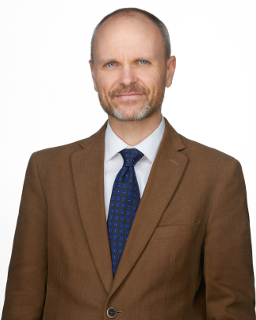Prof. Eric Adams recognized by Canadian Association of Law Teachers
Sarah Kent - 31 May 2024

Professor Eric Adams of the University of Alberta Faculty of Law has been honoured for his work shaping future legal minds and his contributions to legal scholarship.
The Canadian Association of Law Teachers awarded him its academic excellence award at the organization’s annual banquet on May 30. The national award recognizes Adams’ exceptional contributions to research and teaching as a Canadian law teacher in mid-career.
“It is a tremendous honour to be recognized by my colleagues, mentors, and peers in law teaching,” says Adams. “One of the best aspects of this profession is the opportunity to be part of a broader network of legal scholars and teachers across Canada. It's a community I've had the pleasure of learning from, collaborating with, and drawing inspiration from for many years.”
“Closer to home, I'm also deeply grateful for the outstanding group of legal scholars here at the Faculty of Law. I'm indebted to so many of them as models for my teaching and research, but also for the friendship, support, and collegiality that makes the job possible. I would especially like to thank Anna Lund, Ubaka Ogbogu, and Dean Barb Billingsley for supporting my nomination.”
"As a member of the University of Alberta Faculty of Law for the past 15 years, Professor Adams has established an outstanding reputation locally and across Canada as an expert in constitutional law, constitutional history, and employment law,” says Dean Billingsley. “His contributions to research and teaching in these areas are unequivocally exceptional and greatly deserving of recognition by this award."
Recipients are selected based on the quality of and innovation in teaching and learning, and the quality and impact of legal scholarship.
A legal historian and expert in constitutional law, Adams has published widely on diverse aspects of Canadian constitutional law, theory and history.
In 2022, he was awarded the John T. Saywell Prize for Canadian Constitutional Legal History by the Osgoode Society for Canadian Legal History. The award honoured his contributions to the 2020 book, Landscapes of Injustice: A New Perspective on the Internment and Dispossession of Japanese Canadians. The book was the culmination of a seven-year SSHRC-funded Partnership Grant in which Adams served as lead legal historian for the project.
His teaching has been recognized with the Hon. Tevie H. Miller Teaching Excellence Award and the Provost's Award for Early Achievement of Excellence in Undergraduate Teaching.
“The law consists of stories about people trying to find ways of living together well. In the classroom, I've always tried to bring to life some of those stories - the people at the centre of them, the politics surrounding them, the ideas the lawyers and judges wrestle with in making sense of them, and the longer histories from which those stories emerged,” says Adams. “Ideas, political context, history, and people - these are the things that make law fascinating to me. At the same time, law is a craft built upon an analysis of close reading, attention to detail, precision, and rigour.”
“For me, good law teaching is like good lawyering - it aims to combine a larger context with attention to the significance of details.”
Adams is a trusted expert who frequently provides media and editorial commentary on important constitutional issues. He was recognized for his vital work in public-facing education with a Queen Elizabeth II Platinum Jubilee Medal in February 2023.
“My career has always involved a lot of media work, opinion editorial writing, and efforts to try and translate the complexities of law, especially constitutional law, for the public,” he says. “It wasn't an aspect of the job that I planned, but it arrived on my doorstep largely because so many constitutional issues arise in public and political debates.”
“I've always thought that constitutional law cannot be the exclusive domain of lawyers, judges, and lawmakers — its stakes are too high, and its values too deeply interwoven in our politics and culture. To succeed in its aspirations, constitutional law — its everyday workings, rights, structures, and responsibilities — must be a shared project for all of us. For me, that means I feel a responsibility to try and make this important aspect of our law and government accessible to the people for whom it matters most.
He is the second recipient from the U of A to be recognized with the academic excellence award, following Professor Joanna Harrington who was presented with the award in 2018.